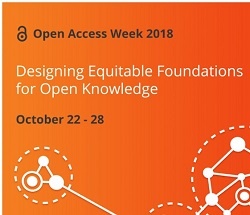Open Access Week: 22-28 October 2018, Globally!
10/09/2018


Open Access Week is a global event held annually in October to raise awareness of the benefits of Open Access in the academic community.
|
"Open Access refers to material that is free to all readers at the point of access, so they can use and share it easily" (OPEN ACCESS at Kent). HowOpenIsIt- Open Access Guide (developed by SPARC) standardizes Open Access terminology in an easily understandable, comprehensive resource. |
Different countries, groups, communitis are joining forces for a new series of events dedicated to 2018 International Open Access Week “Designing Equitable Foundations for Open Knowledge”. For example, OpenAIRE and FOSTER are delivering series of webinars and tutorials.
For more information about planned events and initiatives during International Open Access Week 2018, please visit www.openaccessweek.org and follow the conversation on Twitter at #OAWEEK !
From OPEN ACCESS to... Open Science & Open Data
Open Access Days 2018 – Part I: How is Open Access developing in the context of Open Science?
During the 22nd edition of the International Conference in ELectronic PUBlishing and the 10th anniversary of the meeting in Toronto, Canada, 22-24 June 2018, the Open Access conversation has been extended to Open Science and Open Data. The sustainability of Open Science infrastructures and ongoing community ownership and control of the Knowledge Commons were major themes at ELPUB 2018. The SCOSS initiative (SCOSS: A global Sustainability Coalition for Open Science Services) was introduced to participants, working towards guaranteeing financial sustainability for existing Open Science/Open Access initiatives, addressing the issue of financial sustainability.
Dr Aled Edwards – an expert scientist in structural biology (and pharmaceutical sciences) - delivered a keynote on Open Science for Public Good. Some key messages from his presentation on Open Science include:
Open Science:
- leads to competitive scientific outcomes and reproducible science;
- helps build trust with the public and with patients;
- reduces redundancy, which in turn accelerates research (which is good, since redundancy makes drug discovery less efficient – the drug price is high because it includes the price of failure and redundancy, which could have been avoided if science was open);
- is a transparent way to recruit people (you can actually see people’s work!);
- is sustainable - pharmaceuticals WILL fund open science. This isn’t going to lead them to a drug in the next 5 or 10 years, but it will enable research in other understudied areas. Open drug discovery may be the key to fixing the broken pharmaceutical model and to developing personalized medicines. All have to be collaborative about the funding structures. Governments always care about themselves, often thinking: “How do we make sure country X [us] wins and not country Y [them].” But open collaborations with industry enables academics to learn the market, spot commercial opportunities and launch companies. This should lead to benefit the country first of all;
- is the solution, and should not just be the aim.
An example of an Open Science initiative shared by Dr Edwards: Extreme Open Science Initiative: A team of groundbreaking scientists at SGC, UNC and INSERM are now sharing their lab notebooks online.

Related:
- AIMS online courses on Fundamentals of Information Literacy and Access to Global Online Research in Agriculture; Open & Research Data
- AGORA: Access to Global Online Research in Agriculture
- Two decades on, a research access program continues to thrive: Research4Life partners have renewed their commitment through 2025 and created a new Rule of Law program
- Towards meeting the Directory of Open Access Journals (DOAJ) quality criteria in the global South
- EC Statement: 'Plan S' and 'cOAlition S' – Accelerating the transition to full & immediate Open Access to scientific publications (4 September 2018)
- Why Open Access Publications Get Higher Citations
- FAIR Data Action Plan: Interim recommendations and actions from the European Commission Expert Group on FAIR data
- Best practices in Open Access publishing (recorded webinar, Library Publishing Coalition)
- The tool, called Google Dataset Search, should help researchers to find the data they need more easily
- Open Science for early-career researchers, by O'Neill, Gareth; Hn tkov, Eva; Science Impact Ltd, Volume 2018, Number 6, August 2018, pp. 64-65(2)
- Data Driving Sustainability – the African Open Science Platform Project/ Ina Smith & Susan Veldsman (ELPUB2018)
- The OPEN SCIENCE Training Handbook (FOSTER)
- FOSTER RECOMMENDATIONS on OPEN SCIENCE TRAINING
- Implement effective Open Data & Keep it alive with Open Data TOOLKIT (see sub-section: Training & Guides on Open Data & Data Management & Use & Interoperability)
- Registries for Open Data Repositories, Institutional Repositories, Policies, Journals
- Open Access Button and Unpaywall : an easy way to find Open Access versions of publications
- Paywall: The Business of Scholarship (Full Vimeo Movie under CC BY 4.0)
- Free Open Science training courses
- The African Open Science Platform (AOSP): The Future of Science and the Science of the Future
- Introduction to Text and Data Mining: a free 6 hour online course (from FOSTER & OpenMinTeD projects)
- The case for 'Open Science': Do we need intellectual property law?
-
Open Access, Academic Freedom, and the Spectrum of Coercive Power (The Scholarly Kitchen, 2018)
-
ORCID Public Data File 2018 contain a snapshot of all public data in the ORCID Registry associated with an ORCID record. ORCID publishes this file once per year under a Creative Commons CC0 1.0 Universal public domain dedication
-
Open Access monographs: perspectives from University Presses
- Want to take WIPO's General e-Course on Intellectual Property? Enroll here – it’s free of charge

AIMS.FAO.ORG is looking forward towards creating awareness of the work done in Open Access, Open Data, Open Science through dialogue, capacity development, collaboration and diversity, - in this way science can be advanced much faster, addressing the SDGs (Sustainable Development Goals).
To keep up-to-date with AIMS news, please, Sign up for AIMS News, follow @AIMS_Community on Twitter.
And, thanks again for your interest !
